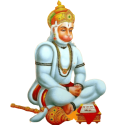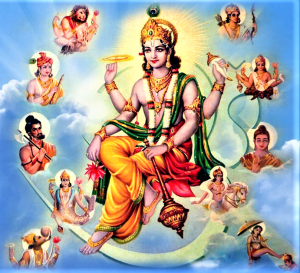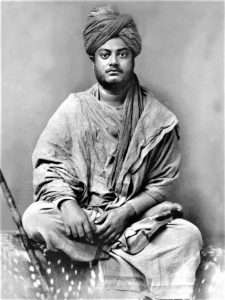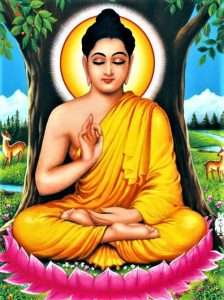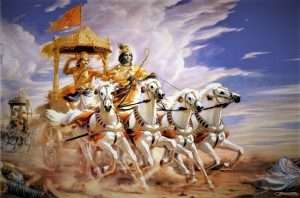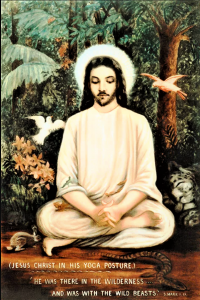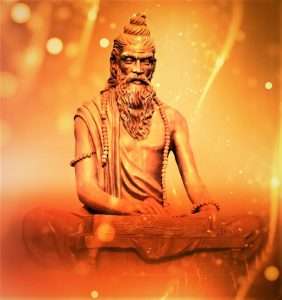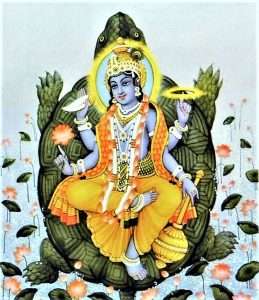Ishvara (God)
Ishvara – In Hinduism (Sanatana Dharma), the Sanskrit word, “Ishvara” means God. There are many words to denote God such as “Ishwara, Brahman and Bhagvan” in Hinduism. At the same time there are many words in other religions also to denote God. In Hinduism, God is acknowledged mainly in two different ways. They are –
- Nirguna (Universal God without attributes)
- Saguna (Personal God with attributes like incarnation of God)
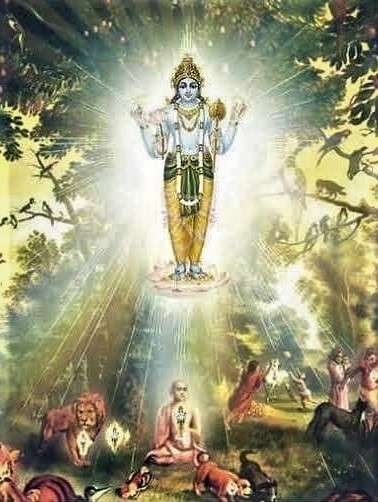
Both the Nirguna and the Saguna God are regarded in both male and female aspects. Hence, they both have male and female names. Some of the popular names of both kinds of God are –
- Nirguna (Male) – AUM, Ishvara (God), Brahman (God), Bhagvan (God), Maalik (Master), Prabhu (Master, God), Parmatma (the highest soul), Jagdishwar (God of the world), Ganardan (God who helps), Vishwambhar (God Who fulfills the world) Parampita (Highest father) and so on.
- Nirguna (Female) – Jaganmata (Mother of the universe), Jagadamba (Mother of the universe), Amba (Mother), Mata (Mother), Parmeshwari (the highest Goddess), Shakti (Power) and so on.
- Saguna (Male) – Hari (One who wipes out sins), Visnu (All-pervasive), Narayan (A place of refuge), Ram (One who dwells in everyone), Krishna (One who attracts), Shiva (One who is auspicious) and so on.
- Saguna (Female) – Laxmi (One who leads to one’s goal), Sita (fertility, Blessings), Radha (Prosperity, Success), Parvati (Daughter of mountain), Durga (Invincible), Kaali (Goddess of time, death), Annapurna (Bestower of food and nourishment) and so on.
Many names for Nirguna God (Male and Female) and Saguna (Male and Female) are also interchanged in different contexts.
God’s name in other religions – In other religions also God has been denoted with many special names. Some of them are –
Judaism – El
Christianity – Jehovah (In the Old Testament), God, Father (In the New Testament)
Islam – Allah
Sufism – Hu or Huwa
Zoroastrianism – Ahura Mazda

Nirguna God – The Sanskrit word, “Nirguna” is made of “Ni” meaning without and “Guna” meaning three qualities (Sattva, Rajas, Tamas) of Prakriti (Nature). Hence Nirguna God means God without the three gunas of Prakriti. The idea of Nirguna God is the God who is all-pervading, unmanifested and cosmic.
Saguna God – The Sanskrit word, “Saguna” is made of “Sa” meaning with and “Guna” meaning three qualities (Sattva, Rajas, Tamas) of Prakriti (Nature). Hence Saguna God means God with the three gunas of Prakriti. The idea of Saguna God is the God who assumes certain forms, manifests as incarnations and does divine sports (Lila).
In Hinduism both ideas of God (Male and Female) are accepted and there is a lot of information about them in the holy scriptures and in the words of enlightened saints.
What is God – God is a very incomprehensible topic to explain. In different religions God has been explained in different ways. In Hinduism we have diverse opinions about God. Hereunder are some of the opinions about God –
- Brahman – In the Veda, the unmanifested and all-pervading God is termed as Brahman. The quality of Brahman is “Satchidananda” which is a combination of three words with special meaning, Sat (existence absolute), Chit (knowledge absolute) and Ananda (bliss absolute). The Brahman is truth, light of lights, all-pervading intelligence, all-pervading Power, omnipotent, omniscient, omnipresent, love, supreme Being, Purushottama (Supreme Purusha), Maheswara (HIghest God) and so on. He is the support of the universe. He contains everything within Himself. The entire universe is in Him like a huge tree in a seed. God is Swasamvedya. He knows by Himself. There is a very beautiful expression in Chandogya Upanishad (3.14.1) which describes the highest unmanifest Brahman (God) –
Sanskrit –
सर्वं खल्विदं ब्रह्म तज्जलानिति शान्त उपासीत। अथ खलु क्रतुमयः पुरुषो यथाक्रतुरस्मिँल्लोके पुरुषो भवति तथेतः प्रेत्य भवति स क्रतुं कुर्वीत॥3.14.1॥
Transliteration –
sarvam khalvidam brahma tajjalaniti shanta upasita| atha khalu kratumayah puruso yathakraturasmin loke puruso bhavati tathetah pretya bhavati sa kratum kurvita||3.14.1||
Translation –
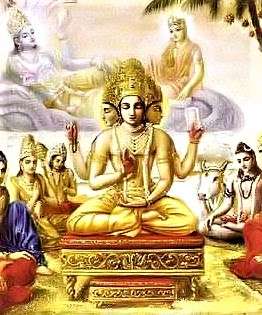
All this is Brahman. Everything comes from Brahman, everything goes back to Brahman and everything exists in Brahman. Therefore, one should quietly meditate on Brahman. Each person has a distinct mind. As a person thinks in present life, so he becomes when he departs from this world. So one should keep this in mind and meditate.
- Ishvara – The Sanskrit word, “Ishvara” comes from the root, “Ish” and “Vara” which respectively means “Chief, Ruler” and “Best”. Hence Ishwara means, “the Best Ruler”. Like the Brahman, Ishwara also has the same implication and characteristics. The Brahma Sutra by the great sage Veda Vyasa opens with “Janmadyasya yatah” which means “from whom is the birth, continuation and dissolution of the universe,” is Ishvara who is Eternal, Pure, Free, Almighty, All-Merciful and the Teacher of all teachers”. The great text Yoga Sutra of Patanjali (1.24) described the term, “Ishwara”. It says –
Sanskrit –
क्लेश कर्म विपाकाशयैरपरामृष्टः पुरुषविशेष ईश्वरः॥1.24॥
Transliteration –
Klesha karma vipaka ashayaih aparamrishtah purushavishesh Ishvarah||1.24||
Translation –
Ishvara is the Supreme Purusha (Supreme God) who is unaffected by afflictions (five afflictions – Ignorance, Egoism, Attachment, Aversion and Fear of death), actions (three types – Black, Bright and Mixed), fruits of action (Three types – Stored, Active and Mature) and latent impressions (maturing actions to bring result in future).
A very famous scripture called “Chaitanya Charitamrita” describes the life and message of God Chaitanya Mahaprabhu. The (Antya 9.44) of the scripture describes “Ishvara” and says –
Hindi –
ईश्वर जगन्नाथ, – यांर हाते सर्व ‘अर्थ’|
कर्तुम अकर्तुम अन्यथा करिते समर्थ”||
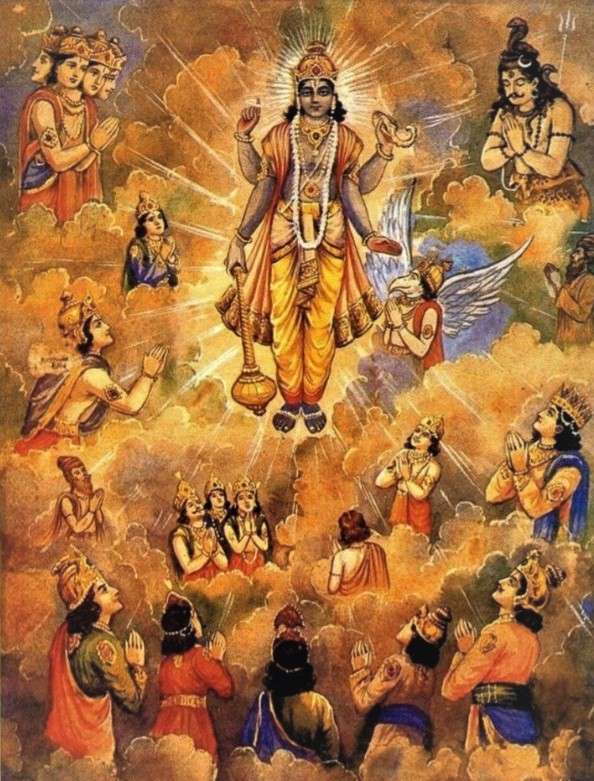
Transliteration –
Ishvara jagannatha, – yanra hate sarva ‘artha’|
Kartum akartum anyatha karite samartha”||
Translation –
God Jagannatha (the one who is the God of the universe) is the Supreme God. He has all potencies, therefore He is able to do what is to be done, can do what is impossible to be done and do otherwise.
- Bhagvan – The Sanskrit word, “Bhagvan” is made with two Sanskrit words, “Bhag” meaning “great wealth, opulence” and “Van” meaning “one who possesses”. Hence Bhagvan means the one who possesses great wealth. In the Vishnu Purana Bhagavan is defined –
Sanskrit –
उत्पत्तिं प्रलयं चैव भूतानामागतिं गतिम्|
वेत्तिं विद्यामविद्यां च स वाच्यो भगवानिति|| 6.5.78||
Transliteration –
Utpattim pralayam chaiva bhutanam agatim gatim|
Vettim vidyam avidyma cha sa vachyo bhagavaniti||6.5.78||
Translation –
He who understands the creation and the dissolution, the appearance and disappearance of beings and the wisdom and the ignorance, is called Bhagavan.
Another verse in Vishnu Purana (6.5.47) describes Bhagvan in the words of the great sage Parashara Muni (the father of Veda Vyasa) –
Sanskrit –

ऐश्वर्यस्य समग्रस्य वीर्यस्य यशसः श्रियः।
ज्ञानवैराग्ययोश्चैव षण्णां भग इतींगना॥6.5.47||
Transliteration –
aishvaryasya samagrasya viryasya yashasah shriyah
Jnana vairagyayosh chaiva shannam bhaga itingana
Translation –
Bhagavan is one who possesses six opulences in full – all prosperity, all strength, all fame, all riches, all wisdom and all renunciation.
He has the six attributes of divine wisdom (Jnana), dispassion (Vairagya), powers (Aishwarya), strength (Bala), wealth (Sri) and fame (Kirti). Hence He is called Bhagavan.
Brahman, Ishwara and Bhagvan – These three words and many others which are used to mean God represent the same entity but different words to represent God may express God in different ways. Hence while using a certain name, we need to see the context and accordingly the right meaning can be understood.
Three different aspects of God – In Hinduism, God has three different aspects with regard to the creative process of the universe. They are –
- Brahma – Brahma is the creative aspect who is responsible for the creation of the universe.
- Vishnu – Vishnu is the preservative aspect who is responsible for the preservation of the creation
- Shiva – Shiva is the destructive aspect who is responsible for the dissolution of the universe.
There are three other aspects of God which constitute the universal process –
- Virat – It is the manifested aspect which is the sum total of all physical bodies.
- Hiranyagarbha – It is the immanent aspect which is the sum total of all minds (Cosmic Mind).
- Ishwara – It is the causal aspect which is the sum total of all causal bodies (Karana Sharira; one of the three layers of any individual body which is the subtlest).
Five activities of God – In general God performs mainly five kinds of activities. They are –
- Srishti (Creation) – God creates the universe.
- Sthiti (Preservation) – God preserves the universal phenomenon.
- Samhara (Destruction) – God dissolves the universe.
- Tirodhana or Tirobhava (Veiling) – God hides the truth from the individual soul in order that the soul go through the experience of life.
- Anugraha (Grace) – God grants knowledge to the individual soul and liberates.
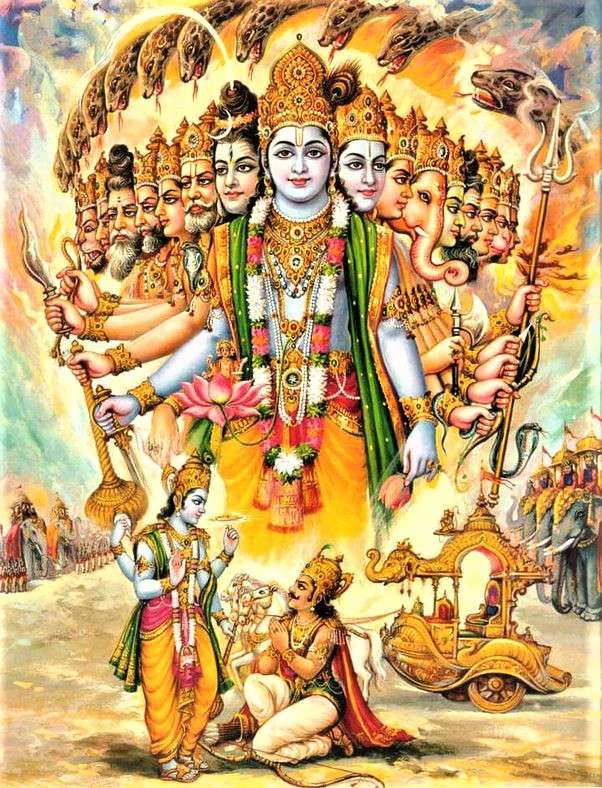
Proof that God exists – It is an endless debate since beginning whether or not God exists. God is mainly a matter of belief and disbelief for people in general. A very few of us have been able to access the true answer to the existence of God who are called enlightened people. For them God is the only reality. There are so many scriptures and words of enlightened people all over the world that talk about the existence of God. However there are some logical approaches that ascertain the existence of God or something very high in nature. St. Thomas Aquinas provides five proofs for the existence of God. They are –
- Motion – All motions are based on a motionless ground. There must be a basis of the motion of all things. That basis is God.
- Causal and effect – Every effect has a cause. Therefore there must be a first cause for the effects. That cause is God.
- Cosmology (Possibility and Necessity) – All events in the world are contingent which necessarily imply an eternal substance which itself is not contingent. That event is God.
- Henology (Gradation) – There is a gradation in things – better, colder, superior and so on. It follows that there must be something that is the best. The best is God.
- Teleology (Design) – Everything in the universe harmoniously fits in with one another’s purposes for an end. There must be a purposive Agent who carries this order in creation. That Agent or Director is God.
Swami Sivananda’s proof on the existence of God – Swami Sivananda observes that everything is changing in this world therefore, there must be a substratum that is unchanging. We cannot think of a changing thing without thinking of something which is unchanging. Forms are finite. You cannot think of a finite object without thinking of something beyond. Further he adds that there is beauty, intelligence, luminosity, law, order, harmony, in spite of apparent disorder and disharmony. Therefore, there must be an omniscient, omnipotent and omnipresent being who governs and controls this vast universe. The world has the character of an effect and the effect always attempts to find rest in its cause. Every visible cause has another higher cause. God is the name we give to the highest cause. In this world of phenomena, there is a cause for everything. The law of cause and effect operates. There is the cause, the father, for the effect which is the child. There is the cause, the seed, for the effect which is the tree. You see this world. There must be a cause for this world, which is an effect. That causeless cause is God or the creator.
The basis of the belief and non-belief in God’s existence – In Hinduism, belief in God is a natural characteristic of a human. However, there are so many people also who do not have any belief in God. According to scriptures and holy people, the belief and non-belief in God depends upon accumulation of Punya (Merits, virtuous deeds) and Papa (Sins, unvirtuous deeds, evil deeds) an individual has from the actions of previous births and present birth. Punya and Papa have been duly described in Hindu scriptures. They say is Subhasitani –
Sanskrit
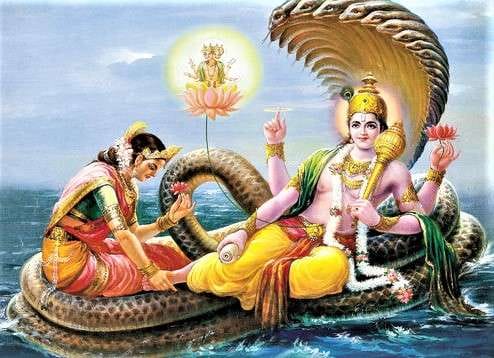
अष्टादश पुराणेषु व्यासस्य वचनद्वयम्।
परोपकार: पुण्याय पापाय परपीडनम्।।
Transliteration –
Ashtadasha puraneshu Vyasasya vachanam dvayam|
Paropakaraha punyaya papaya parapidanam||
Translation – In all of the eighteen Puranas, Veda Vyasa has given two special precepts that helping others is “Punya” whereas hurting others is “Papa”.
The great sage Yajnavalkya explains in Brihadaranyaka Upanishad (4.4.5) –
Sanskrit –
यथाचारी यथाचारी तथा भवति साधुकारी साधुर्भवति, पापकारी पापो भवति पुण्यः पुण्येन कर्मणा भवति, पापः पापेन|
Transliteration –
Yathakari yathachari tatha bhavati sadhukari sadhurbhavati, papakari papo bhavati; punyah puṇyena karmana bhavati, papah papena|
Translation –
As it (the Soul; the individual) does and acts, so it becomes. by doing virtue it becomes virtuous and by doing unvirtuous it becomes unvirtuous.
Those actions which have positive results, elevate and bring good happenings are results of Punya. Those actions which have negative results, degrade and bring bad happenings are called Papa. A person’s birth in a privileged family is the result of his Punya and another person’s birth in an unprivileged family with conditions of disease, war, problems is the result of Papa. Both Punya and Papa move like wheels and they keep coming into one’s life and he goes through good and bad phases in life. But in human life this situation is not fixed. With continuous spiritual efforts, prayers, meditation, Yoga, virtuous acts and so on, one can overcome the effect of Papa. When Sattva (one of the three qualities of Prakriti; nature) predominates, then an individual is naturally inclined towards virtue and begins to perform virtuous acts, with the dominance of Rajas (one of the three qualities of Prakriti; nature) he performs selfish acts and with the dominance of Tamas (one of the three qualities of Prakriti; nature) he performs evil and unvirtuous acts.
God Krishna says in the Bhagavad Gita (7.15) –
Sanskrit –
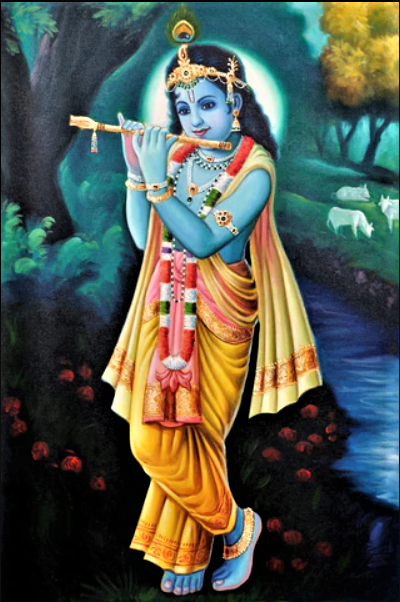
न मां दुष्कृतिनो मूढा: प्रपद्यन्ते नराधमा:|
माययापहृतज्ञाना आसुरं भावमाश्रिता:|| 15||
Transliteration –
Na mam dushkritino mudhah prapadyante naradhamah|
Mayayapahrita jnana asuram bhavam ashritah||15||
Translation –
The evil-doers, deluded, lowest of people who are ignorant of knowledge, whose discrimination has been robbed by Maya (the illusive powers of God) and those with demoniac nature do not seek Me (God, God Krishna).
Quite in tune, God Krishna says in the Bhagavad Gita (7.16) –
Sanskrit –
चतुर्विधा भजन्ते मां जनाः सुकृतिनोऽर्जुन।
आर्तो जिज्ञासुरर्थार्थी ज्ञानी च भरतर्षभ।।16।।
Transliteration –
Chaturvidha bhajante mam janah sukrtino Arjuna|
Arto jijnasur artharthi jnani cha bharatarsabha||16||
Translation –
O the best among the Bharata Arjuna! Four kinds of pious people worship Me (God, God Krishna) – the distressed, the seeker after knowledge, the desirer of wealth and seeker after the knowledge of the Absolute (God, God Krishna).
Further God Krishna says in the Bhagavad Gita (7.28) –
Sanskrit –
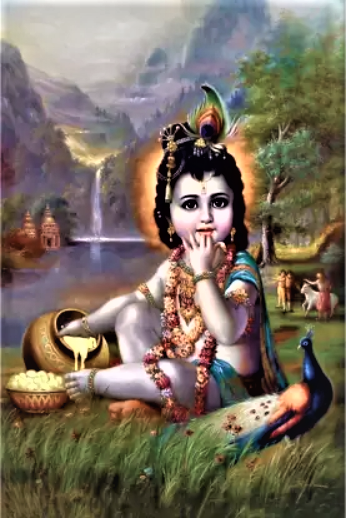
येषां त्वन्तगतं पापं जनानां पुण्यकर्मणाम्।
ते द्वन्द्वमोहनिर्मुक्ता भजन्ते मां दृढव्रता:॥28॥
Yesam tvantagatam papam jananam punya karmaṇam|
Te dvandva moha nirmukta bhajante mam dridha vratah||28||
Translation –
Those whose sinful actions are completely expiated, have done pious activities in their previous and the present lives, who are free from delusions and dualities of life worship Me (God, God Krishna) and engage in My service with firm determination.
God Krishna further says in the Bhagavad Gita (7.19) –
Sanskrit –
बहूनां जन्मनामन्ते ज्ञानवान्मां प्रपद्यते।
वासुदेव: सर्वमिति स महात्मा सुदुर्लभ:॥19॥
Transliteration –
Bahunam janmanamante jnanavan mam prapadyate|
Vasudevah sarvamiti sa mahatma sudurlabhah||19||
Translation –
After many births, he who attains knowledge takes refuge unto Me (God, God Krishna), knowing Me (God, God Krishna) everything and in everything (the cause of all causes). Such a great soul is extremely rare.
Therefore, belief and non-belief in God is an individual thing depending upon how much purity (Punya) and impurity (Papa) one has in his conscience. Everyone is growing according to his own actions for which he alone is responsible. Passing through various experiences of life each one of us one day will come to realize if there is anything like God. Until then it is very important that we try to cultivate virtues in our lives by doing good to others as much as possible.
God’s grace and enlightened saints’ blessings as the basis of belief in God – The holy scriptures proclaim that belief in God mainly comes by the grace of God and enlightened saints. The Great Shankaracharya writes in “Vivek Chudamani” –
Sanskrit –
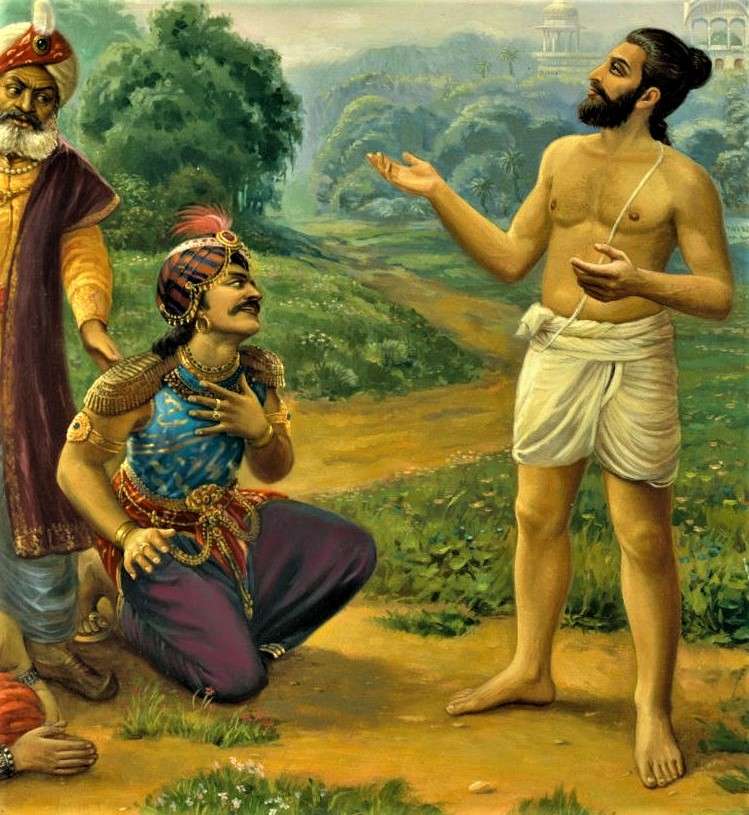
दुर्लभं त्रयमेवैतद्देवानुग्रहहेतुकम्।
मनुष्यत्वं मुमुक्षुत्वं महापुरुषसंश्रयः॥3॥
Transliteration –
Durlabham trayamevaitad devanugrahahetukam|
Manusyatvam mumuksutvam mahapurusasamsrayah||3||
Translation –
Three things are rare indeed which are only due to the grace of God – a human birth, the longing for liberation and refuge to an enlightened sage.
In Srimad Bhagavatam (5.12.12), the conversation between Jad Bharat and King Rahugan also highlights the importance of the association and blessings of enlightened saints. It says –
Sanskrit –
रहूगणैतत्तपसा न याति न चेज्यया निर्वपणाद् गृहाद्वा।
नच्छन्दसा नैव जलाग्निसूर्यै-र्विना महत्पादरजोऽभिषेकम्॥12॥
Transliteration –
Rahuganaitat tapasa na yati na cejyaya nirvapanad grhad va
Na cchandasa naiva jalagnisuryair vina mahat padarajobhisekam||12||
Translation –
Dear King Rahugana, one cannot realize God (the Absolute Truth) simply by doing austerities, by performing Vedic rituals, by resorting to a renounced life, by strictly following the rules and regulations of household life, by observing celibacy, by chanting of the Vedic hymns and scriptures, by performing penances within cold water, before blazing fire, in the scorching heat of the sun unless he has the grace to smear his entire body with the dust of the lotus feet of great devotees of God.
The belief in God and the attainment of God and truth can only be possible when God Himself wills so and the association of enlightened saints happens. Both are indispensable. When God showers His blessings on someone, then He allows the individual to come across such a divine soul who blesses him with the divine knowledge. This has been the way for ages.
Where God lives – According to the holy scriptures and holy people, God is everywhere. In fact God has become everything. The whole manifested creation is God Himself. God is also the source of the entire creation so He does not have a source. Hence God is a sourceless source and causeless cause. This all-pervading God also incarnates. According to the incarnation, He assumes special names and forms such as Ram, Krishna, Buddha, Jesus, Mohammad and so on. God’s mighty presence is described in chapter 10 of the Bhagavad Gita and many other scriptures of the world. God’s visible powers are the sweetness in children, strength in warriors, beauty in mountains and trees, melody in music, fragrance in flowers and mind and prana in bodies. The Ishavasyopnisad (1.1) says –
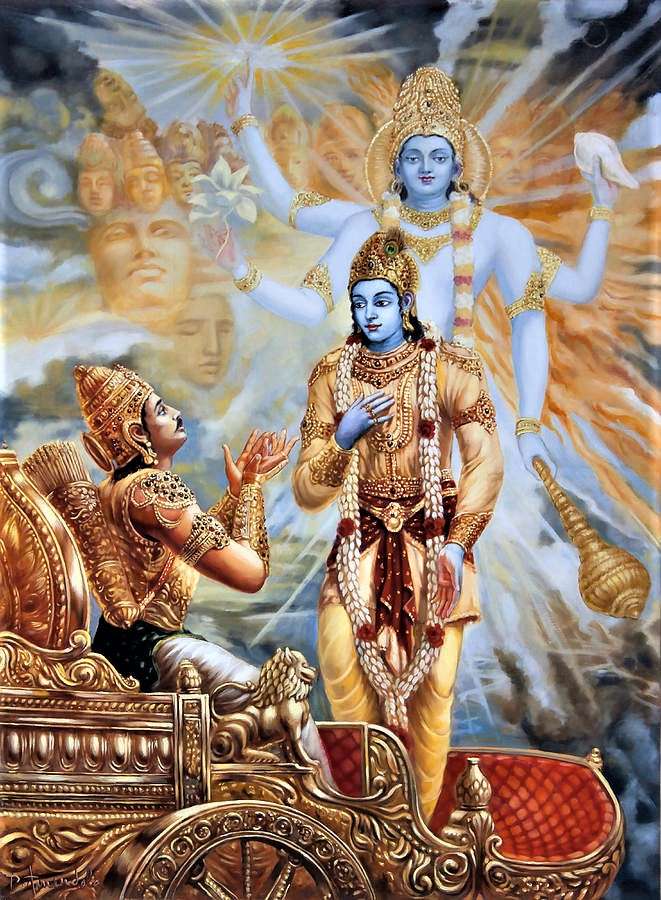
Sanskrit –
ईशा वास्यमिदं सर्वं यत्किञ्च जगत्यां जगत्।
तेन त्यक्तेन भुञ्जीथा मा गृधः कस्यस्विद्धनम्॥1||
Transliteration –
Isa vasyamidam sarvam yatkinchita jagatyaṁ jagat|
Tena tyaktena bhunjitha ma grdhah kasyasviddhanam||1||
Translation –
Everything in the universe, both animate or inanimate are pervaded and owned by God. Therefore, one should enjoy things needed for oneself without greed, for whose is this wealth?
God Krishna says in the Bhagavad Gita (7.7) –
Sanskrit –
मत्त: परतरं नान्यत्किञ्चिदस्ति धनञ्जय|
मयि सर्वमिदं प्रोतं सूत्रे मणिगणा इव|| 7||
Transliteration –
Mattah parataram nanyat kinchidasti dhananjaya|
mayi sarvamidam protam sutre manigana iva||7||
Translation –
O Dhananjaya (Arjuna)! There is nothing higher than Me (God, God Krishna). Everything is strung on Me, as gems on a string.
Krishna says again in the Bhagavad Gita (10.8) –
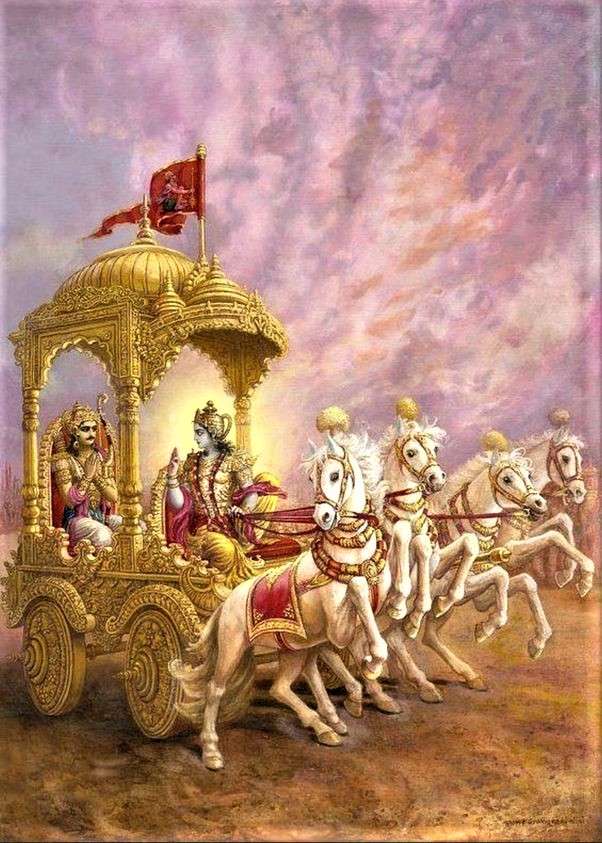
Sanskrit –
अहं सर्वस्य प्रभवो मत्त: सर्वं प्रवर्तते।
इति मत्वा भजन्ते मां बुधा भावसमन्विता:॥8॥
Transliteration –
Aham sarvasya prabhavo mattah sarvam pravartate|
Iti matva bhajante mam budha bhavasamanvitah||8||
Translation –
I am the source of everything. Everything emanates from Me. The wise who surely know this engage themselves in My service and worship with devotion.
God Krishna says further in the Bhagavad Gita (18.61) –
ईश्वर: सर्वभूतानां हृद्देशेऽर्जुन तिष्ठति|
भ्रामयन्सर्वभूतानि यन्त्रारूढानि मायया|| 61||
Transliteration –
Ishvarah sarvabhutanam hriddesherjuna tisthati|
Bhramayan sarvabhutani yantrarudhani mayaya||61||
Translation –
O Arjuna! The Ishvara (Supreme God, God Krishna) dwells in the hearts of all beings. As a rider in a machine, He is beguiling all beings by His Maya (Illusive powers).
Do we need to believe in God or acknowledge God – We don’t need to believe in God at all but we do need to understand the value of virtues in our lives. Belief in God and non-belief in God is a natural trait depending upon Punya (Merits, virtuous deeds) and Papa (Sins, unvirtuous deeds, evil deeds). But we need to at least intellectually recognize the importance of everything around us. Even a speck of dust is not lifeless and without any purpose. What we call living beings simply mean the vibration of life at a certain intensity which is perceivable for us. What we call non-living beings simply mean the vibration of life at a certain intensity which is non-perceivable for us. All things around are bright and beautiful at some level for different beings. The Bhagavad Gita chapter (11) describes the cosmic form of God (God Krishna) in entirety which simply means that all this visible or invisible phenomenon are nothing but the will of God. Hence everything is God and His divine sports. It is not important that everyone should have the same level of faith and belief in God or personal God. Those who believe in God may rejoice in the taste of these scriptural references but what about those who do not relate to the idea of God. For them, the idea is little different in words but in essence the same and that is “Doing good to others”. We all know how extraordinary a sense of lightness and peace we feel when we offer help to others. This uniqueness of feelings is the glimpse of Godliness. When we go ahead with this approach in life then we reach the same point where the believers in God arrive at. Hence belief in God is extraordinary but at the sametime non-belief in God is no barrier. We do not need to believe in God and acknowledge the existence of God. The very simple thing is that we should make efforts to practice humanity and treat all beings with respect, love and compassion.
Grace of God – Most of us believe that the grace of God is success, fulfilment of various desires, happy life and so on. But in fact these are not the grace of God. They are results of Good actions in the past which we have done. The results of good actions (Punya) bring ease in life and the results of bad actions (Papa) bring difficulties in life. Of course, God is behind every happenings of life but the grace of God means – detachment towards objects of senses, leaning towards virtues, association of holy saints, desire for liberation, devotion towards God and godliness and so on. God Krishna reveals the secret of His grace to His disciple Uddhava in the Srimad Bhagavavatam (10.88.8,9,10). God Krishna says –
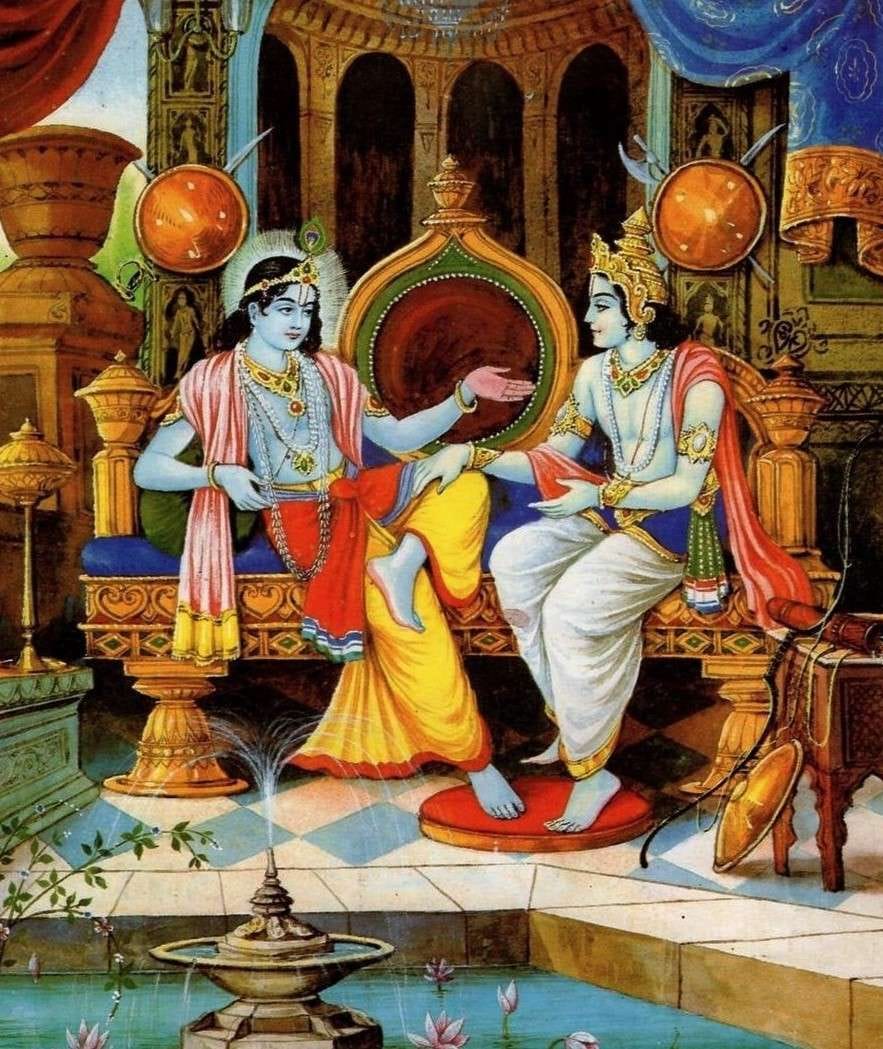
Sanskrit –
श्रीभगवानुवाच
यस्याहमनुगृह्णामि हरिष्ये तद्धनं शनै:।
ततोऽधनं त्यजन्त्यस्य स्वजना दु:खदु:खितम्॥8॥
Transliteration –
Sri Bhagavan uvaca –
Yasyaham anugrhnami harisye taddhanam sanaih|
Tato dhanam tyajantyasya svajana duhkha duhkhitam||8||
Translation –
God Krishna says – When I shower special grace on someone then I gradually deprive him of his wealth. Then the relatives and friends of such a poor man abandon him. This way he suffers one distress after another.
Sanskrit –
स यदा वितथोद्योगो निर्विण्ण: स्याद् धनेहया।
मत्परै: कृतमैत्रस्य करिष्ये मदनुग्रहम्॥9॥
Sa yada vitathodyogo nirvinnah syad dhanehaya|
Matparaih kritamaitrasya karisye madanugraham||9||
Translation –
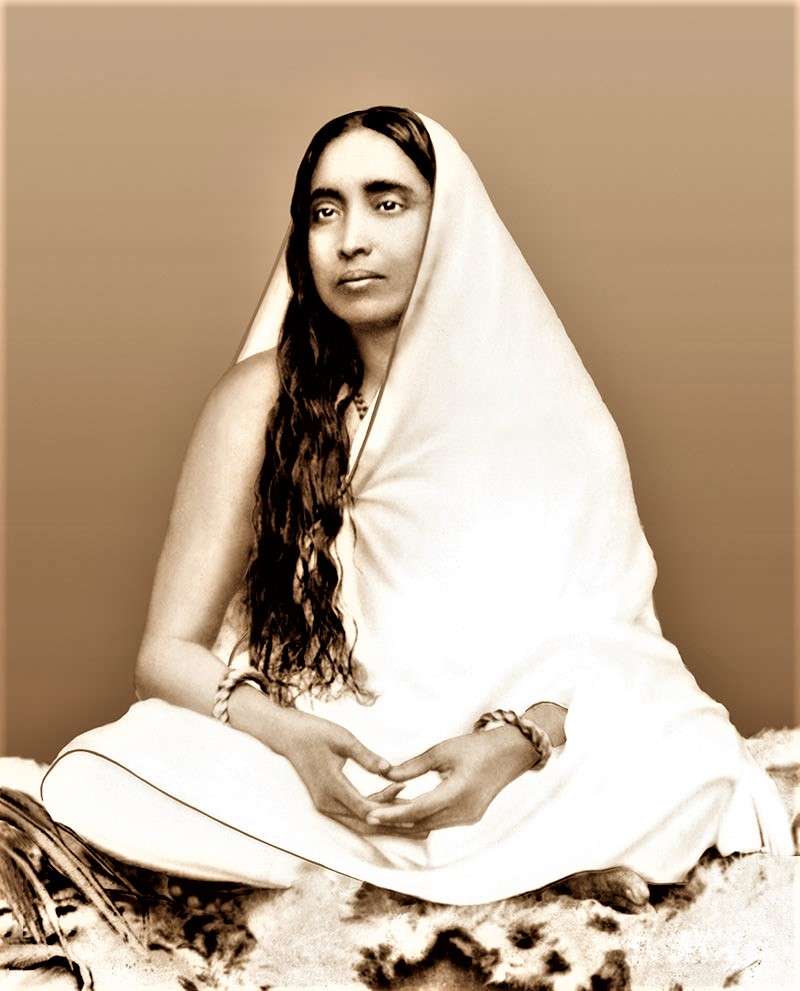
He becomes frustrated in his repeated attempts to make money. Instead he becomes friends with My devotees and then I shower My grace upon him.
Sanskrit –
तद् ब्रह्म परमं सूक्ष्मं चिन्मात्रं सदनन्तकम्।
विज्ञायात्मतया धीर: संसारात्परिमुच्यते॥10॥
Transliteration –
Tad brahma paramam suksmam chinmatram sadanantakam|
Vijyatmataya dhirah samsarat parimuchyate||10||
Translation – Thus he becomes pacified and fully realizes Brahman as the highest truth, the most subtle, the perfect manifestation of the soul, the transcendental existence without an end and the supreme truth. In this way realizing the ultimate truth as the basis of his own existence, he becomes free from the cycle of material life.
Therefore, the real grace of God does not lie in accumulation of material things and becoming engrossed with them but developing natural detachment to the worldly ties and intense desire to attain enlightenment and love for God. This has been affirmed by great saints of the world such as Ramakrishna Paramhamsa, Maa Sharada, Swami Vivekananda, Parahmamsa Yogananda, Swami Sivananda and so on.
Conclusion – God is the most important topic in all scriptures of the world. All scriptures, all prophets and all saints of the world have eulogized God in the highest esteem. They have also said that the Goal of human life is the attainment of God and be free from the bondage of the world. It is only by God’s grace one feels a deep desire to know God. It does not matter how we approach God but what matters the most is that we turn to God. For whatever reason, for whatever purpose and for whatever way we approach God is all acceptable. However the path shown by enlightened people is the safest and surest. The highest and the easiest way to approach God is by developing love for Him. This has been the unanimous declaration of all saints of the world. God is the truth and God alone is the truth.
With Love and Gratefulness (Founder Rohit Kumar)
Source – Gita, Yoga Sutra, words of Swami Vivekananda, Swami Sivananda, Swami Satyananda, internet resources and personal study.
Hari Om Tat Sat!

